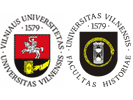There have not been any researches on the Medieval Christian world outlook done in Lithuania at all. A bit more of attention was given to such problems as interaction of ancient balts with christian culture, baltic view at christianity. Usually those topics are squeezed in XIII–XIV century frame, which is more actual.
Recently scholars succeeded in grounding the conseptuality of 1009 in historiography. In this context renovatio conception was determined, however mostly meaning it’s political expression. But also not less important is the portend of Christian world outlook in renovatio policy, beginning with Carlemagne and ending the most significant person in this policy – Otto III.
The political expression and dimension of Otto’s renovatio conception areclear enough: the emperor is christomimetes on the earth, his power comes out of Dei gratia and he rules all over christian world. The emperor appoints popes and bishops, organizes missions (this is connected (or bounded up) with conditionally weak, if compare to emperor’s, popes power in VIII–XI centuries). Also another one of the most important goals of renovatio in to make conditions for old and newlyrisen countries of Central and Eastern Europe (firstly Hungary and Poland) to become a part of federation created sy Otto. They were supposed to become rulers of certain federal subjects, allies of the emperor, who could help in restoration of the hole empire, who could expand and praise it.
Christian world outlook is also very important. It let Otto settle himself in to the existance of christomimetes, by using this to declare emperor’s responsibility to expand christianity in pagan lands, responsibility fos the salvation of every christian soul. Those facts explain such misions to Baltic lands as the mission of St. Adalbert-Wojciech, St. Bruno of Querfurt, mission of 5 benedictine monks. All of them were organized by Otto (untill Dictatus papae). Renovatio policy served as a tool for Otto to get the whole world under his crown (including Byzantine empere and Kiev Russia). Inversely, Otto shows that his empire is not civitas terrena orcivitas deaboli – according to St. Augustine, who thought that the fight for salvation of souls in going on the earth and in „another“ world as eschatology minor. The emperor indentified himself with christomimetes, that meant that his country couldn’t be identified with civitas deaboli any more. Civitas terrena was a temporary sohelter for a man. The same temporarity is waiting for a soul in „another world“ until the day of a Last Court. Only after the Last Court it will become clear where which soul will be going – to hell or paradise. Only a good behavior, good works dedicated soul and body helped people to achieve an eternal life. The formation of such behavior was one of the main tasks and functions of the emperor.
In conlusion the idea of federation, as mush as christian view formed conditions fo peaceful missions in Eastern Europe. Military actions began mush later. They are connected with changes in Church’s life after announcing of Dictatus papae, also with changes in the world outlook and events in the Holy land, whish led to the beginning of the Crusade. |


 dizainas ir programavimas giriaus
dizainas ir programavimas giriaus  dizainas ir programavimas giriaus
dizainas ir programavimas giriaus